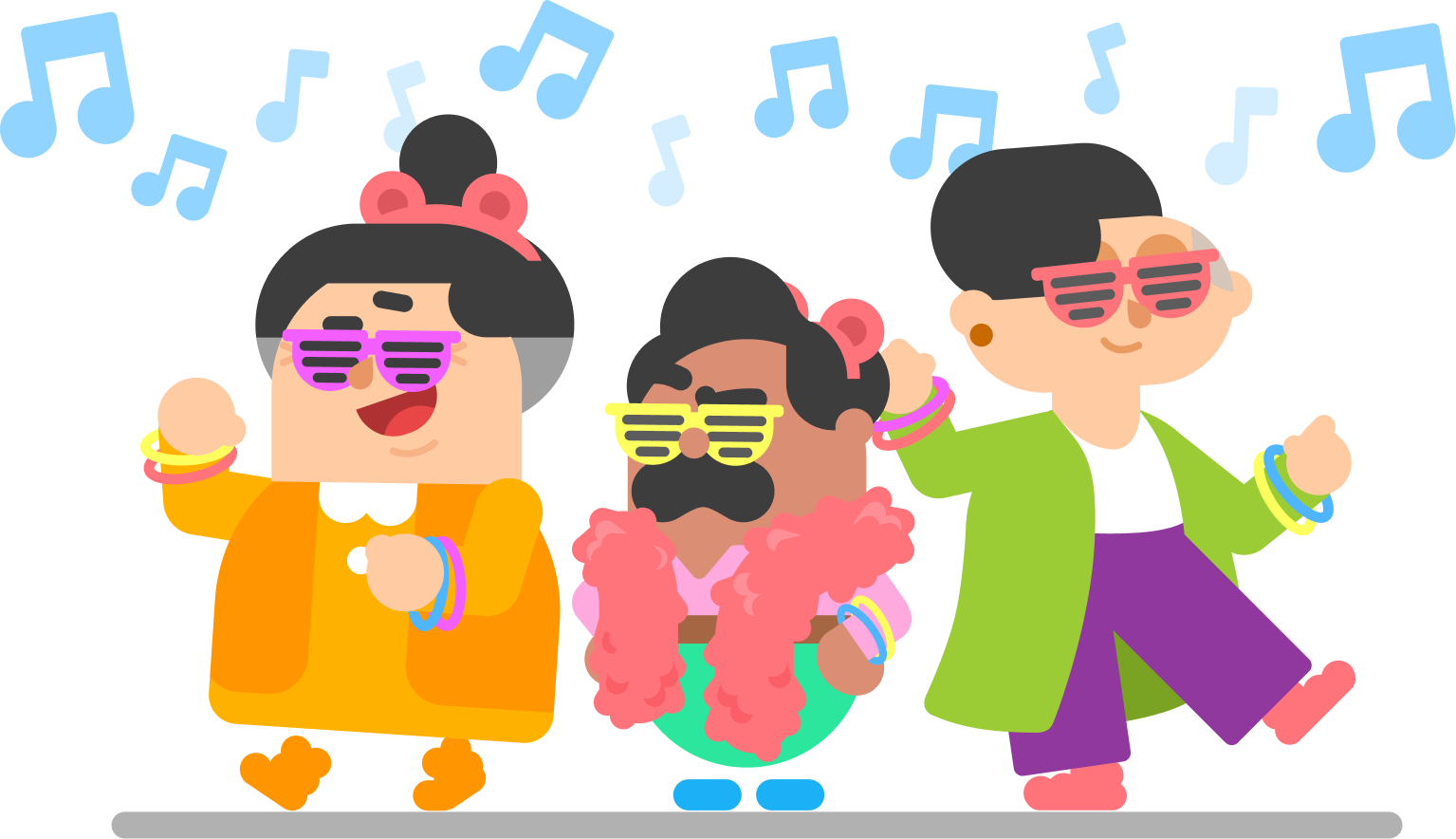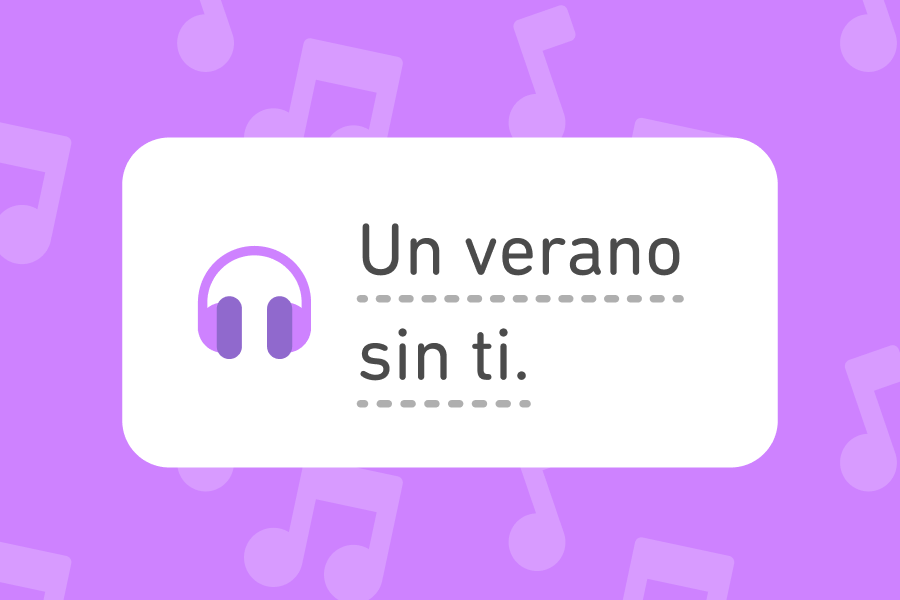Here’s something beginner and advanced Spanish learners might not realize: There are lots of Spanish lessons hidden in Bad Bunny lyrics!
Here are just a few of the things you’ll learn about Spanish and Puerto Rico when listening (or dancing, or working out) to Bad Bunny.
Bad Bunny is proud of Puerto Rican Spanish (and it shows)
Song: “Un verano sin ti”
Lyric: The whole song!
Meaning: Bad Bunny puts Puerto Rican Spanish on display in all his music, and Un verano sin ti is filled with great examples! Here are some things you’ll find in Caribbean Spanishes, including some that are especially common in Puerto Rico:
- “S” is often not pronounced at the ends of words. You might notice this written in lyrics with apostrophes to show the deleted sound. Listen for tú sabe’ (you know), tanto’ consejo’ (so much advice), and todo’ lo’ plane’ que hicimo’ (all the plans that we made). You’ll also find many examples of “s” deletion inside words, too, before sounds like “p,” “t,” and “k” (often written with “c”): de’pedida (farewell), e’toy (I am), li’ta (ready), and e’cribo (I write).
- “R” is pronounced as “L” at the ends of words. In Puerto Rican Spanish this means that all those verbs ending in ‑ar, ‑er, and ‑ir will have an “L” sound at the end instead! You’ll also hear it in amol (love) and before consonants in the middle of words, like in cualto (room). So, for Bad Bunny, “my love” is mi amol! 💗
- English words are used in Spanish sentences. Due to Puerto Rico’s unique relationship with the U.S., Spanglish, or codeswitching, is even more common in Puerto Rico than in other parts of Latin America (where you’ll find English and mixing, too). Some of this mixing is due to words in different languages evoking different feelings for bilinguals in Puerto Rico—it’s not because they don’t know the word in the other language (they definitely do!). In Un verano sin ti, Bad Bunny says Sorry por ser yo (Sorry for being who I am)—which is an especially cool switch between languages because the English word “sorry” is pronounced with the Spanish trill for “rr.” This sentence is truly a mix of languages!
- English words are Spanish-ified… and then spread around the world! Another result of bilingualism in Puerto Rico is that some English words get fully adopted into Spanish, and even get Spanish spellings and word endings. A great example of this is jangueo (I hang out) from the (new!) verb janguear (to hang out). In Spanish, “j” is pronounced like English “h” and new verbs adopted into Spanish often get the ending ‑ear to make them ‑ar verbs. Janguear has become so popular that you’ll hear it in many parts of Latin America!
Bad Bunny shines a light on Puerto Rican politics
Song: “Andrea”
Lyric: “Quiere quedarse en PR, no irse pa’ ningún estado”
Meaning: The relationship between Puerto Rico and Puerto Ricans and the U.S. is complicated: There’s a long history of migration to the “mainland” or “los estados” (the States) and young people on the island feel pulled by large Puerto Rican communities in the U.S. to move to los estados. Bad Bunny often references the pride that many young Puerto Ricans feel by choosing to stay, favoring their roots and identity over economic opportunity (this narrative is also featured prominently in his song El Apagón and its music video). In the song Andrea, Bad Bunny also recognizes that women in Puerto Rico (and across Latin America) are frequent targets of gender-based violence, and he tells the story of one of these victims, Andrea, in an effort to honor her life and bring awareness to the situation.
Bad Bunny is a big shot when it comes to Latin American Spanish
Song: “Andrea”
Lyric: “Bichotes y rapero’”
Meaning: The term bichote comes from the English term “big shot” (another perfect Spanglish example!)! This Puerto Rican slang is widely used in reggaeton and is used increasingly throughout Latin American Spanish. You might also hear the feminine form, bichota, used in Latin America as a word for female empowerment. Just a few years ago, bichote would have been unknown outside Puerto Rico, but Bad Bunny and reggaeton have changed that!

Bad Bunny prioritizes me, myself, and I
Song: “Trellas”
Lyric: “Me pregunté” / “Me acordé” / “Me gusta”
Meaning: The little word me (pronounced like English “may”) has a lot of meanings, all of them about “me.” It means "myself" in me pregunté (I asked myself), and in me acordé, it is part of the expression acordarse de, the Spanish phrase for “to remember something.” And me is the pronoun used with gustar to talk about liking something: me gusta (I like) and me gustaba (I liked, or I used to like).
Bad Bunny gets whatever Bad Bunny wants
Song: “Yo visto así”
Lyric: “Yo hago lo que quiera”
Meaning: Lo que quiera means “whatever I want,” and in Yo visto así, there are a lot of things Bad Bunny is doing however he wants: You’ll hear Me pongo lo que quiera (I put on whatever I want) and Yo hago lo que quiera (I do whatever I want). Lo que is Spanish for “that which,” or, less formally, “the thing that,” and learners will hear that in other parts of the song as well. Quiera is the subjunctive form of the verb querer (to want or wish), and it’s used with lo que to show that what Bad Bunny wants includes whatever he wants, without limit!
Bad Bunny appreciates the li’l things
Song: “Neverita”
Lyric: “En la neverita”
Meaning: Spanish uses the diminutive endings ‑ito and ‑ita to show affection, playfulness and closeness. Neverita is from the word nevera (a refrigerator or a cooler). Here, Bad Bunny means a cooler that he has taken to the beach, and the ‑ita ending gives the feeling of a li’l cooler, one familiar to him. In this song, that’s where Bad Bunny’s love interest puts her corazón (heart)! You’ll also hear ‑ita at the end of every line of the chorus, in solita from sola (alone) and chamaquita from chamaca (a slang term for “girl”). And that quita’ in the chorus? That’s the verb quitas, without the “s”!
Bad Bunny is a Good Teacher
Listening to music in the language you’re learning is a great way to practice what you study, and doing things you love is a great way to stay motivated in your learning. 💪 And if you’re a Spanish learner, Bad Bunny makes for an excellent teacher! 🕶
For more music to help you practice Spanish, check out Duolingo’s Spanish playlist on Spotify, where you’ll find these Bad Bunny songs and many more from artists across Latin America!
